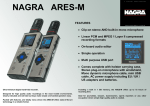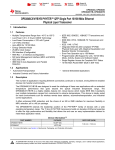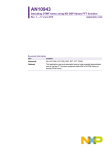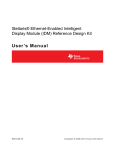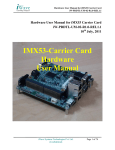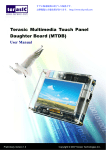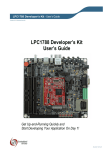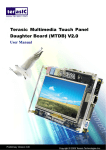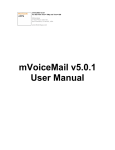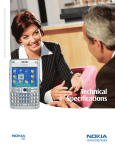Download RDB1768V2 Development Board User Manual
Transcript
RDB1768V2 Development Board User Manual 2/27/2010 Rev.1 Copyright Code Red Technologies Inc. 2009 Page 1 of 18 1 2 OVERVIEW 1.1 LPC1768 Features 3 1.2 RDB1768V2 Evaluation Board Hardware 3 COMPONENTS 2.1 3 3 5 Component descriptions 5 HARDWARE 7 3.1 Schematics 7 3.2 Mapping of peripherals to LPC1768 IO pins 14 4 IO PADS FOR EXTERNAL CONNECTION 16 5 DEVELOPING AND DEBUGGING 17 6 REFERENCES 18 Copyright Code Red Technologies Inc. 2009 Page 2 of 18 1 OVERVIEW The RDB1768V2 Evaluation Board gives a solid development platform for the development of systems around the NXP LPC1768 Cortex-M3 based Microcontroller. The LPC1768 is the ‘superset’ part of the LPC17xx family, and therefore the RDB1768 makes an excellent development board for the whole LPC17xx family of parts. The board allows the rapid prototyping of embedded systems through the use of the on-board peripheral interfaces and supplied example software, or by connecting external hardware to the IO pads. 1.1 LPC1768 Features • 512K Bytes of on-chip FLASH • 64K Bytes on-chip SRAM (in 2 banks) • 10/100 Ethernet MAC with external PHY interface • USB Host/Device OTG controller and PHY. USB 2 full-speed • I2S Digital Audio interface • 3 I2C interfaces • 2 SSP interfaces • 1 SPI interface • 2 CAN interfaces • 8-channel, 12-bit on-chip ADC • 10-bit on-chip DAC • PWM generation • Quadrature Encoder Interface • 4 GP Timers • Ultra low-power Real-Time-Clock • Up to 70 GPIO pins 1.2 RDB1768V2 Evaluation Board Hardware • Drag2FLASH feature makes board appear as mass storage device for simple binary file FLASHing • LPC1768 running at 100MHz • 128x128 pixel color LCD display driven by GPIO port pins • Ethernet PHY – SMSC LAN8720 • USB Device interface with standard ‘Mini-B’ connector • USB Host interface with standard ‘A’ connector • On-board USB debug interface (no need for a debug probe) Copyright Code Red Technologies Inc. 2009 Page 3 of 18 • UDA1380 Stereo Audio codec connected to the LPC1768 I2S port with Headphone-out, Line-out, Line-in and Mic-in connectors. UDA1380 configuration uses I2C0. Rx and Tx I2S are decoupled so different sample rates can be used. • Micro-SD card socket wired to SSP0/SPI port • RS232 COM port interface on UART0 of LPC1768. Can be used to program LPC1768 FLASH in In-System Programming (ISP) mode • Switching mini-Joystick with left, right, up, down and select outputs • On board amplifier and speaker can be driven by UDA1380 codec and/or LPC1768 DAC • Potentiometer connected to ADC input • 12MHz Crystal for the main LPC1768 clock (simple multiple for USB) • 25MHz Crystal for the Ethernet PHY • On board regulators for 3v3 derived from Debug USB Mini-B, USB Device Mini-B or Power connector • All on-board peripherals can be disconnected by removable links on the board. All LPC1768 IO pins brought out to pin-thro pads for connection of external peripherals. For more information see section 4. Copyright Code Red Technologies Inc. 2009 Page 4 of 18 2 COMPONENTS 2.1 Component descriptions NAME DESCRIPTION COM RS232 COM port connected to UART0 on the LPC2368 S1 Dual DIP switch to allow configuration of ISP through the COM port USB Dev USB Device Mini-B connector. Can be used to power the board. USB Host USB Host ‘A’ connector. Can supply power to peripherals. Is limited to 500mA, but if board is being powered from one of it’s USB device sockets then the capability will be less LED1 LED1 indicates when an external debug probe is connected to the Copyright Code Red Technologies Inc. 2009 Page 5 of 18 JTAG/SWD connector LED 2-5 User LEDS connected to P1_24, P1_25, P1_28, P1_29 NAME DESCRIPTION MicroSD Micro-SD Card socket. Pins connect to SSI0/SPI on the LPC1768 Display 128x128 pixel color LCD display RST Reset button for processor ISP ISP button. Hold down with RST, then release RST first to enter ISP mode ETH The Ethernet connector TP2 Scope probe GND post Line-in Stereo 3.5mm connector line level input connector to the audio codec Mic-in Sensitive mic input to the audio codec S2 Dual DIP switch to select the source of audio to the speaker. Either the Codec, the DAC or a mix of both. Headphone Stereo 3.5mm connector for driving audio headphones Line-out Stereo 3.5mm line-level output from the audio codec Debug USB Mini-B connector for use of ‘on-board’ debug – direct connect to PC for debug with Red Suite. Can be used to power the board. JTAG/SWD Standard 0.05” pitch 2x5 pin JTAG/SWD connector for use of external debug probe such as Red Probe PSU External power supply connector – 5V D.C. regulated TP1 Scope probe GND post LED6 The power-on LED LED7 USB device ‘Goodlink’ LED UH1, UH2 User Headers with all IO pins Speaker Speaker driven from either on-chip DAC, or audio codec. Source is selected by S2. Joystick 4-way + select, switch style joystick ADC Pot Potentiometer connected to Analogue to Digital Convertor (ADC) of LPC1768 Copyright Code Red Technologies Inc. 2009 Page 6 of 18 3 HARDWARE 3.1 Schematics Copyright Code Red Technologies Inc. 2009 Page 7 of 18 Copyright Code Red Technologies Inc. 2009 Page 8 of 18 Copyright Code Red Technologies Inc. 2009 Page 9 of 18 Copyright Code Red Technologies Inc. 2009 Page 10 of 18 Copyright Code Red Technologies Inc. 2009 Page 11 of 18 Copyright Code Red Technologies Inc. 2009 Page 12 of 18 Copyright Code Red Technologies Inc. 2009 Page 13 of 18 3.2 Mapping of peripherals to LPC1768 IO pins Port Bit MODE Usage PERIPHERAL JOYSTICK 0 0 GPIO joystick left 0 1 GPIO joystick right JOYSTICK 0 2 UART UART_TXD COM 0 3 UART UART_RXD COM 0 4 GPIO joystick up JOYSTICK 0 5 GPIO joystick down JOYSTICK 0 6 GPIO joystick click JOYSTICK 0 7 I2S I2STX_CLK AUDIO 0 8 I2S I2STX_WS AUDIO 0 9 I2S I2STX_SDA AUDIO 0 10 GPIO CODEC_RESET AUDIO 0 15 SPI sd_sck SD 0 16 SPI sd_cs SD 0 17 SPI sd_do SD 0 18 SPI sd_di SD 0 23 ADC POTENTIOMETER POT 0 25 I2S I2SRX_SDA AUDIO 0 26 DAC DACOUT AUDIO 0 27 I2C SDA AUDIO 0 28 I2C SCL AUDIO 0 29 USB USB DEVICE D+ USB 0 30 USB USB DEVICE D- USB 1 0 ETH txd_0 ETHERNET 1 1 txd_1 ETHERNET 1 4 tx_en ETHERNET 1 8 CRS ETHERNET 1 9 RXD_0 ETHERNET rxd_1 ETHERNET rx_er ETHERNET 1 10 1 14 1 16 1 17 1 18 1 1 ETH ETH ETH ETH ETH ETH ETH COMMENTS mdc ETHERNET mdio ETHERNET USB USB GOODLINK LED USB 19 USB usb_port_pwr USB 22 USB usb_ppwrd# USB 1 24 GPIO LED2 (USER) LED 1 25 GPIO LED3 (USER) LED 1 27 USB usb_ovrcr USB 1 28 GPIO LED4 (USER) LED 1 29 GPIO LED5 (USER) LED 1 30 USB USBDEV VBUS USB Detect VBUS 2 0 GPIO db0 display PIN 19 of ST7637 display controller 2 1 GPIO db1 display PIN 18 of ST7637 display controller 2 2 GPIO db2 display PIN 17 of ST7637 display controller 2 3 GPIO db3 display PIN 16 of ST7637 display controller ETH USB HOST POWER ENABLE Overcurrent detect on the USB HOST Copyright Code Red Technologies Inc. 2009 Page 14 of 18 PORT MODE USAGE PERIPHERAL COMMENTS 2 BIT 4 GPIO db4 display PIN 15 of ST7637 display controller 2 5 GPIO db5 display PIN 14 of ST7637 display controller 2 6 GPIO db6 display PIN 13 of ST7637 display controller 2 7 GPIO db7 display PIN 12 of ST7637 display controller 2 8 GPIO A0 display PIN 9 of ST7637 display controller 2 9 USB USB CONNECT USB 2 10 ISP BOOT ISP BOOT 2 11 GPIO WR display PIN 10 of ST7637 display controller 2 12 GPIO RD display PIN 11 of ST7637 display controller 2 13 GPIO CSB (chip select) display PIN 7 of ST7637 display controller 3 25 GPIO RESB (reset) display PIN 8 of ST7637 display controller 4 28 GPIO TX_MCLK AUDIO Copyright Code Red Technologies Inc. 2009 Page 15 of 18 4 IO PADS FOR EXTERNAL CONNECTION On the RDB1768, all of the peripherals on the board can be electrically isolated from the LPC1768 through the removal of links on the board. These are all labelled on the board. For example if the link labelled ‘LK2_0’ is removed, this will disconnect the display from IO pin P2_0. This will then allow the user to add any external peripheral using P2_0, connecting through the user headers UH1 and UH2. The pinouts for user headers UH1 and UH2 can be seen on the schematics and below. Copyright Code Red Technologies Inc. 2009 Page 16 of 18 5 DEVELOPING AND DEBUGGING The RDB1768 is designed to interface seamlessly with the Red Suite Development Environment from Code Red Technologies. Simply connecting a PC to the RDB1768 with the USB debug port enables Red Suite to be used as your code development and debugging environment. TM The Drag2FLASH feature allows users to simply drag built binary files onto an Explorer window and press the button to FLASH the LPC1768 and start running the code. The board also has a standard 10-pin 0.05” pitch JTAG/SWD connector. An external debug probe can be connected to this port for debugging. Red Probe from Code Red Technologies can be used with Red Suite 2 and connected directly to this connector. Alternatively, other debug probes and tool chains may be connected through this standard connector pin-out. Copyright Code Red Technologies Inc. 2009 Page 17 of 18 6 REFERENCES 1. CODE RED TECHNOLOGIES SUPPORT WIKI: www.code-red-tech.com/CodeRedWiki 2. NXP LPC17xx USER MANUAL: http://www.standardics.nxp.com/products/lpc1000/all/ 3. NXP LPC17xx DATA SHEETS: http://www.standardics.nxp.com/products/lpc1000/all/ 4. ARM CORTEX-M3 TECHNICAL REFERENCE MANUAL: http://infocenter.arm.com/help/index.jsp?topic=/com.arm.doc.ddi0337g/index.html 5. FORMIKE KWH0151DN01-061A 128X128 COLOR DISPLAY SPECIFICATION Supplied as pdf. 6. SITRONIX ST7637 DISPLAY DRIVER DATA SHEET (AS USED ON ABOVE DISPLAY MODULE) Supplied as pdf. 7. National Semiconductor DP83848C PHYTER ETHERNET PHY DATASHEET: http://www.national.com/pf/DP/DP83848C.html 8. Cirrus Logic CS42L51 audio codec data sheet: http://www.cirrus.com/en/products/pro/detail/P1088.html Copyright Code Red Technologies Inc. 2009 Page 18 of 18


















